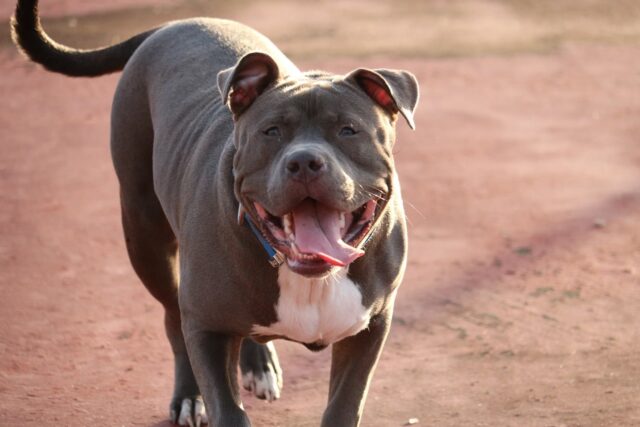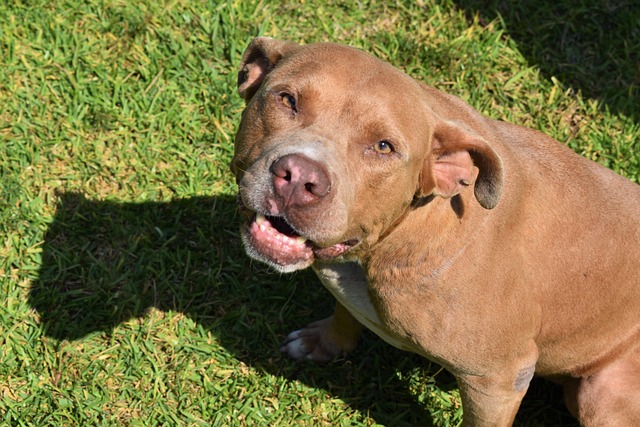1. How many hours a day should my Pit Bull sleep?
On average, a Pit Bull should sleep between 12 to 14 hours a day. This might seem like a lot, but dogs, in general, require more sleep than humans to maintain their health and well-being. Pit Bulls are active dogs that expend a lot of energy when awake, so they need plenty of rest to recharge. This sleep isn’t always continuous; they often take several naps throughout the day and night. Puppies and older Pit Bulls might need even more sleep, with puppies sleeping up to 20 hours a day to support their rapid growth and development, and seniors resting more due to reduced energy levels. It’s important to provide a comfortable and quiet environment for your Pit Bull to sleep, ensuring they can relax and get the rest they need. As long as your dog is active and healthy when awake, this amount of sleep is completely normal and nothing to be concerned about.
2. Is it normal for my Pit Bull to sleep all day?
Yes, it can be normal for your Pit Bull to sleep most of the day, especially if they are a puppy, a senior, or if they’ve had a particularly active day. Dogs naturally sleep more than humans because their sleep cycles are different, consisting of shorter periods of deep sleep followed by wakefulness. However, while it’s normal for them to take several naps throughout the day, your Pit Bull should still be active and alert during their waking hours. If you notice that your dog is lethargic, uninterested in activities they usually enjoy, or sleeping excessively beyond their usual pattern, it might be a good idea to consult with a vet. There could be underlying health issues, such as hypothyroidism, anemia, or other conditions that could cause increased sleepiness. Monitoring your dog’s overall behavior and energy levels will help you determine if their sleep patterns are healthy.
3. Do Pit Bulls need more sleep as they age?
Yes, as Pit Bulls age, they generally require more sleep. Older dogs tend to tire more quickly and need additional rest to recover from daily activities. This is a normal part of the aging process as their metabolism slows down, and they may develop joint issues or other age-related health problems that make them less active. Senior Pit Bulls may sleep upwards of 16 hours a day, with more frequent and longer naps. It’s important to provide them with a comfortable sleeping area that supports their joints, such as an orthopedic dog bed, to help them rest better. While it’s natural for an aging dog to sleep more, sudden changes in sleep patterns or excessive lethargy can sometimes indicate health issues like arthritis, cognitive dysfunction, or other age-related conditions. Regular vet check-ups are essential to ensure that your senior Pit Bull’s increased sleep is a normal part of aging and not a sign of a more serious issue.
4. Why does my Pit Bull seem to sleep more than other dogs?
There could be several reasons why your Pit Bull sleeps more than other dogs. Firstly, individual dogs, like people, have different energy levels and sleep needs. Your Pit Bull might naturally require more rest due to their unique metabolism or activity level. If your Pit Bull is particularly active when awake, they may need more downtime to recover. Additionally, factors such as age, diet, and overall health play a significant role in determining how much sleep a dog needs. For example, a Pit Bull with a balanced diet that provides all the necessary nutrients is more likely to maintain a healthy energy level and, consequently, may sleep more soundly. Stress or changes in the environment can also affect sleep patterns. If your dog seems to be sleeping more than usual and shows other signs of illness or discomfort, it’s always best to consult a vet to rule out any potential health issues.
5. Is it okay if my Pit Bull sleeps in bed with me?
Yes, it’s perfectly okay for your Pit Bull to sleep in bed with you if both you and your dog are comfortable with it. Many dog owners enjoy the comfort and companionship of having their dog sleep in bed with them. However, there are a few considerations to keep in mind. First, make sure your Pit Bull has their own designated sleeping space in case they need to rest separately. Also, consider whether your dog has any behavioral issues, such as territorial aggression, that could be exacerbated by sharing a bed. Hygiene is another factor; make sure your dog is clean and free of pests like fleas or ticks before allowing them in your bed. Finally, be mindful of your own sleep quality—if your dog’s movements or snoring disrupt your sleep, it might be better for both of you if they sleep in their own bed nearby. Overall, as long as it works for you and your dog, sharing a bed can be a great bonding experience.
6. How can I help my Pit Bull get better sleep?
To help your Pit Bull get better sleep, focus on creating a consistent routine and a comfortable sleep environment. Dogs thrive on routine, so try to establish a regular schedule for feeding, exercise, and bedtime. A tired dog is more likely to sleep soundly, so ensure your Pit Bull gets enough physical activity during the day. Providing a comfortable, quiet, and secure place to sleep is crucial. An orthopedic dog bed can offer support, especially for older dogs with joint issues. Additionally, try to minimize noise and distractions during sleep time. If your dog is restless at night, it might help to offer a calming bedtime snack or use calming aids like lavender-scented sprays or a white noise machine. Ensuring that your Pit Bull’s diet is balanced and that they are not hungry or too full at bedtime can also improve their sleep quality. If you suspect your dog isn’t sleeping well due to anxiety or health issues, a visit to the vet can help address any underlying problems.
7. What should I do if my Pit Bull is restless at night?
If your Pit Bull is restless at night, there are a few steps you can take to help them settle down. First, assess their evening routine to ensure they’re getting enough exercise during the day; a tired dog is more likely to sleep soundly. However, avoid vigorous exercise right before bed, as this can sometimes have the opposite effect. Establish a calming bedtime routine, such as a short walk, some quiet time, or gentle petting, to signal that it’s time to wind down. Ensure that their sleeping environment is comfortable, with a supportive bed and a quiet, darkened space. If your Pit Bull continues to be restless, consider whether anxiety might be a factor. Calming aids like a Thundershirt, calming chews, or white noise machines can help reduce anxiety. Additionally, ensure that your dog isn’t hungry or needing to go outside. If restlessness persists, consult your vet to rule out any underlying medical conditions like pain, digestive issues, or other health concerns.
8. Is excessive sleep in my Pit Bull a sign of a health issue?
While it’s normal for dogs, including Pit Bulls, to sleep a lot, excessive sleep could sometimes be a sign of a health issue. If your Pit Bull is sleeping significantly more than the typical 12 to 14 hours a day, and especially if they are lethargic or disinterested in activities they usually enjoy, it could indicate an underlying problem. Health issues that can cause increased sleepiness include hypothyroidism, anemia, heart disease, and infections. Additionally, if your dog is older, conditions like arthritis or cognitive dysfunction could lead to more sleep. Depression and anxiety can also cause changes in sleep patterns. Monitoring your Pit Bull’s behavior during waking hours can provide clues—if they seem less active, have a decreased appetite, or show signs of discomfort, it’s best to consult with your vet. A thorough examination and possibly some blood work can help determine if there’s an underlying health issue that needs to be addressed.
9. How does my Pit Bull’s diet affect their sleep?
Your Pit Bull’s diet plays a significant role in their overall health and can directly impact their sleep patterns. A balanced diet that provides all the necessary nutrients will help your dog maintain healthy energy levels and, in turn, regulate their sleep. Foods rich in omega-3 fatty acids, such as fish oil, can promote brain health and reduce inflammation, potentially improving sleep quality. Feeding your Pit Bull at regular times can help establish a routine that promotes better sleep. Avoid feeding them too late in the evening, as a full stomach could make them uncomfortable and disrupt their sleep. On the other hand, a dog that is hungry at bedtime may also have trouble settling down. Additionally, treats high in sugar or other stimulants should be avoided before bedtime. If your Pit Bull has food allergies or sensitivities, it could lead to discomfort, itching, or digestive issues that interfere with sleep. Ensuring that your dog’s diet is well-balanced and free from ingredients that may cause discomfort is key to promoting restful sleep.
10. What are the signs that my Pit Bull isn’t getting enough sleep?
If your Pit Bull isn’t getting enough sleep, you may notice changes in their behavior and health. Signs of sleep deprivation in dogs can include increased irritability or aggression, difficulty concentrating during training or play, and a lack of interest in activities they usually enjoy. You might also see physical signs like red or droopy eyes, excessive yawning, and a general lethargic demeanor when they should be active. Over time, insufficient sleep can lead to a weakened immune system, making your dog more susceptible to illness. In more severe cases, sleep deprivation can cause disorientation, anxiety, or even depression. If you observe these signs in your Pit Bull, it’s important to assess their sleep environment and routine to ensure they’re getting enough rest. This might involve providing a more comfortable sleeping space, adjusting their exercise routine, or addressing any underlying health issues that might be causing discomfort. If the problem persists, consulting a vet is recommended to rule out any medical conditions affecting their sleep.


 Toledo, United States.
Toledo, United States.
